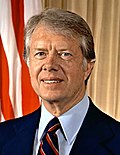 | |
| Other short titles | National Aquaculture Act of 1979 |
|---|---|
| Long title | An Act to provide for the development of aquaculture in the United States, and for other purposes. |
| Enacted by | the 96th United States Congress |
| Effective | September 26, 1980 |
| Citations | |
| Public law | 96-362 |
| Statutes at Large | 94 Stat. 1198 |
| Codification | |
| Titles amended | 16 U.S.C.: Conservation |
| U.S.C. sections created | 16 U.S.C. ch. 48 § 2801 |
| Legislative history | |
| |
The National Aquaculture Act of 1980 (P.L. 96-362, as amended) is intended to promote and support the development of private aquaculture and to ensure coordination among the various federal agencies that have aquaculture programs and policies. It provided for a national aquaculture policy, including a formal National Aquaculture Development Plan; established a Joint Subcommittee on Aquaculture on which officials of USDA, Commerce, the Interior, and nine other federal agencies sit; designated USDA as the lead agency for coordination; and authorized the National Aquaculture Information Center within the National Agricultural Library. [1] [2]
The S. 1650 legislation was passed by the 96th U.S. Congressional session and signed into law by the 39th President of the United States Jimmy Carter on September 26, 1980. [3]

